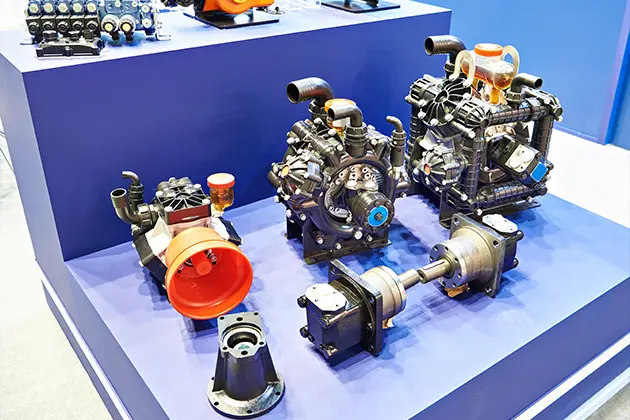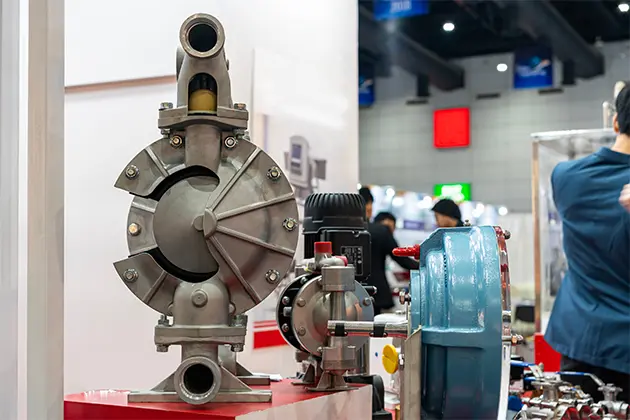Diaphragm pumps have emerged as indispensable tools for various applications. Known for their versatility and durability, these pumps are widely used across industries due to their ability to handle challenging fluids, from corrosive chemicals to viscous substances. With advancements in technology, diaphragm pumps now offer enhanced performance to optimize their processes. Let’s explore 17 key industrial applications of diaphragm pumps and why they are a game-changer for modern industries.
1. Chemical Processing
Diaphragm pumps are widely used in chemical processing for their ability to handle aggressive and corrosive chemicals. Their non-reactive components ensure safe and efficient transfer of hazardous materials. It is a reliable choice in handling acids, solvents, and other reactive substances. Leading providers like KNF offer advanced diaphragm pump technology, which ensures efficient fluid handling, chemical resistance, and minimal maintenance requirements.
2. Water Treatment
Diaphragm pumps are crucial for dosing and metering chemicals like chlorine, sodium hydroxide, and other disinfectants in water treatment plans. Their precise flow control and chemical compatibility make them ideal for clean and safe water.
3. Pharmaceutical and Biotech
Pharmaceutical and biotech industries demand high levels of hygiene and precision. Diaphragm pumps meet these needs by offering sanitary-grade designs that prevent contamination while accurately transferring sensitive fluids, including vaccines, syrups, and biological samples.
4. Food and Beverage
The food and beverage industry benefits from diaphragm pumps due to their hygienic, FDA-compliant materials. They are often used to pump syrups, oils, dairy products, and even carbonated beverages without compromising product integrity or quality.
5. Paints and Coatings
Diaphragm pumps handle highly viscous fluids, making them ideal for the paints and coatings industry. Whether transferring latex, varnishes, or thinners, these pumps ensure smooth, clog-free operation even with thick materials.
6. Oil and Gas
The oil and gas sector uses diaphragm pumps for a variety of tasks, including transferring crude oil, injecting chemicals, and dewatering. Their robust design withstands the harsh conditions of this industry, including extreme temperatures and corrosive fluids.
7. Mining and Quarrying
Diaphragm pumps are used for dewatering pits, transferring slurry, and handling abrasive materials. Their ability to handle solids-laden fluids without damage ensures longevity and operational efficiency in demanding environments.
8. Agriculture
Agricultural applications often require the precise spraying and transfer of fertilizers, pesticides, and other chemicals. Diaphragm pumps excel in this area by offering consistent pressure and reliable performance, ensuring optimal crop protection and yield.
9. Electronics Manufacturing
Diaphragm pumps are used to transfer and dispense high-purity chemicals and cleaning agents. Their non-contaminating materials and precise flow control help maintain the integrity of sensitive components.
10. Automotive Industry
The automotive industry uses diaphragm pumps for a variety of processes, including spraying, lubricating, and transferring fluids such as adhesives and coolants. Their versatility ensures smooth production and assembly line operations.
11. Laboratory and Research
Diaphragm pumps excel in laboratories and research facilities, offering precision for tasks like liquid chromatography and chemical transfers. In the medical field, diverse applications challenge miniature pump designs, including piston, peristaltic, and eccentric diaphragm pumps. Emerging options, like rotary diaphragm pumps, stand out for their unique features, versatility, and specialized benefits.
12. Textile Industry
Diaphragm pumps play a vital role in the textile industry by transferring dyes, pigments, and chemical treatments used in fabric processing. Their precision and ability to handle viscous fluids without contamination help achieve consistent quality in textile production.
13. Pulp and Paper
The pulp and paper industry relies on diaphragm pumps for the precise metering of chemicals used in bleaching, coating, and pH control. The robust design ensures reliable operation even in highly corrosive and abrasive environments.
14. Renewable Energy
Diaphragm pumps are used for applications such as coolant circulation, lubricant transfer, and chemical dosing in energy storage systems. Their efficiency and low maintenance requirements make them ideal for supporting sustainable energy operations.
15. HVAC Systems
Diaphragm pumps are essential in heating, ventilation, and air conditioning (HVAC) systems. They are used for transferring coolants, maintaining pressure in closed-loop systems, and handling dehumidification processes. Their reliability ensures optimal system performance and energy efficiency in both residential and industrial settings.
16. Marine and Shipbuilding
Diaphragm pumps are widely used in the marine and shipbuilding industry for bilge pumping, ballast transfer, and waste management. Their robust construction enables them to handle seawater, sludge, and other challenging fluids while withstanding the harsh marine environment. Additionally, their low maintenance and ability to run dry make them ideal for critical marine applications.
17. Cosmetics and Personal Care
The cosmetics and personal care industry relies on diaphragm pumps for precise handling of viscous and sensitive products like lotions, creams, and gels. These pumps ensure consistent flow rates, protect product integrity, and meet hygienic standards, making them essential for manufacturing processes in this sector.
Bottom Line
Diaphragm pumps have proven to be a reliable and versatile solution across industries. Their ability to handle diverse fluids, maintain operational efficiency, and ensure durability makes them an indispensable tool in modern industrial processes. Investing in the right diaphragm pump can be the key to unlocking operational excellence and staying ahead in a competitive market.











